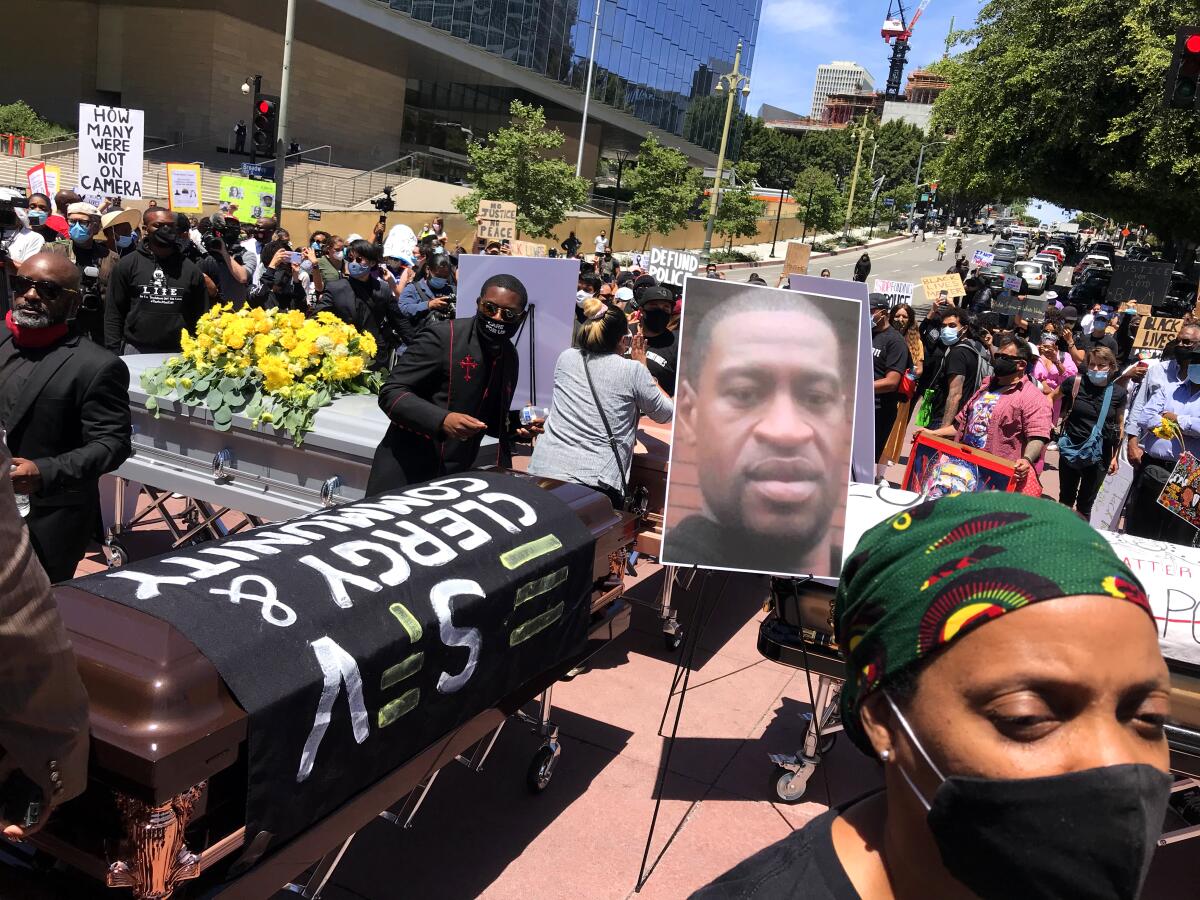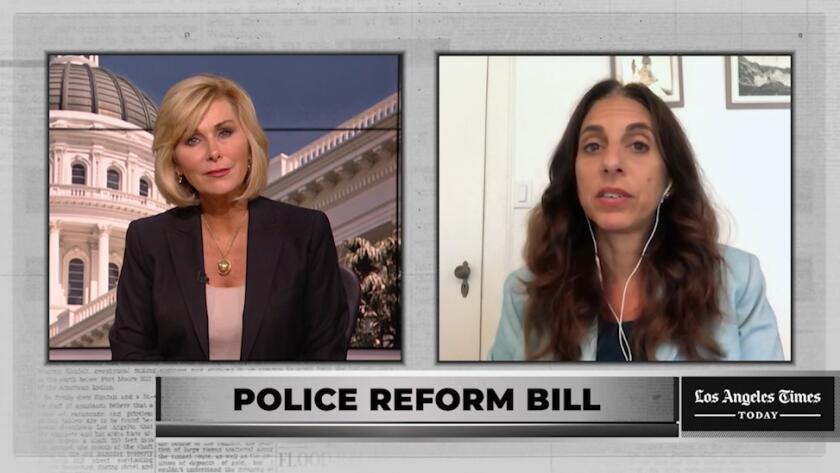California considers strict ‘George Floyd’ law to punish police who fail to intervene

- Share via
SACRAMENTO — Outraged that Minneapolis officers stood by while their colleague killed George Floyd, California lawmakers are considering a tough law to punish police who fail to intervene when witnessing potential excessive force — including possible criminal charges and being banned from law enforcement.
If enacted, the proposed law would put California at the forefront of legal efforts to criminalize the “blue code of silence” that many say contributed to Floyd’s death.
But the bill, authored by Assemblyman Chris Holden (D-Pasadena), has set off a fight with law enforcement agencies around the state who contend the rule is largely redundant but places a criminal penalty on officers during situations that often involve split-second decisions.
Floyd, a Black man, was killed on May 25 by Minneapolis police officer Derek Chauvin, who placed his knee on Floyd’s neck for almost eight minutes, until Floyd became unresponsive. Three other officers at the scene failed to stop Chauvin, though Floyd said he could not breathe.
“It shattered my heart,” said Holden. “It was the inaction of the other officers that caused a real concern because they never tried to stop it.”
Chauvin has been charged with third-degree murder, second-degree murder and manslaughter. His three colleagues, Thomas Lane, Tou Thao and J. Alexander Kueng, have been charged with aiding and abetting second-degree murder and manslaughter.
Holden’s bill would make bystander officers an accessory to any crime committed by the officer using undue force if they failed to take action.
Holden said that despite current mandates and policies that give officers a duty to intervene, his measure is needed to clarify what that action means and how officers should be trained. It would also provide whistleblower protections to officers who report excessive force, and prohibit a person from remaining an officer if they were found to have used excessive force unnecessarily that resulted to great bodily injury or death, or failed to intervene in that situation.
“There needs to be physical intervention,” he said. “There also needs to be making sure that the body camera is on, that there is an effort to deescalate the situation.”
But law enforcement officials said the bill is unfair to officers because it doesn’t take into account that the Floyd case, in which officers had time to react, is an anomaly. They said that most use-of-force happens quickly, and often in chaotic situations, and that holding officers to an inflexible duty to intervene is not practical or fair.
“This misguided proposal criminalizes officers who may not have a complete understanding of the incident and have different viewpoints. Strong policies, robust training and fair discipline is far more appropriate than criminal sanctions,” said the board of directors of the Los Angeles Police Protective League in a statement.
Ed Obayashi, a statewide police trainer, said that measure was “impractical” and presented a broad solution to a narrow problem. Obayashi said that a situation like Floyd’s death, where other officers are present but not actively taking part, is rare, and legislating for it could create confusion in more common situations.
He gave the example of recent protests where the use of rubber bullets and other projectiles have been questioned as excessive force, pointing out that it would have been difficult for other officers present in those situations to determine if the force was warranted and if they had a duty to intervene.
“It’s a slippery slope because what are you going to say, that you’ve got 30 officers in a skirmish line and one deploys a projectile and it hits someone in the head. What are the other officers supposed to do?” he asked.
The proposal also drew the ire of law enforcement for language that would have upended a deal brokered last year to pass Assembly Bill 392, which revamped California’s use of force law. That contentious measure brought weeks of emotional protests to the Capitol in the wake of the shooting of Stephon Clark by Sacramento police who mistook his cellphone for a gun.
Gov. Gavin Newsom engineered a last-minute compromise between law enforcement and reform advocates that convinced police to end the opposition to the measure, but softened some of its language. That deal largely centered on the definition, or lack of it, of a single word: necessary.
In the aftermath of several controversial police shootings in California, activists and victims’ families have hoped their anguish would lead to action.
Police reform advocates wanted a clear definition that deadly force could only be used when other options had been exhausted. Law enforcement argued successfully that the strict definition was not always possible. The word was ultimately left in the law, but its meaning left to the discretion of prosecutors and courts.
Earlier this week, a definition of what “necessary” means was added to both Holden’s bill and another by the author of AB 392, Shirley Weber (D-San Diego).
Law enforcement lobbyists were angered, considering it a backdoor measure to undo the deal brokered by Newsom.
The Weber bill, AB 1709, will not move forward this year.
Holden said Wednesday he was unaware of the significance of the language, and is in the process of removing that portion of the bill. He said it was “recently brought to our attention that this was part of the governor’s negotiation with law enforcement with [AB] 392” and it was not his intent to change the state’s use of force law again.
- Share via
Watch LA Times Today at 7 PM on Spectrum News 1 on channel 1, on Cox systems in Palos Verdes and Orange County on channel 99, and live stream on the Spectrum News App.
More to Read
Sign up for Essential California
The most important California stories and recommendations in your inbox every morning.
You may occasionally receive promotional content from the Los Angeles Times.















